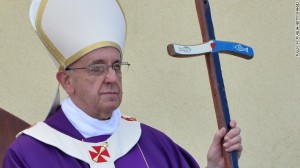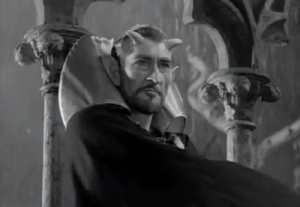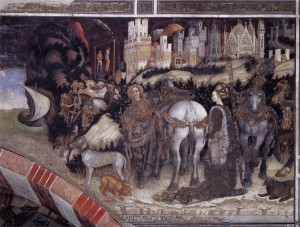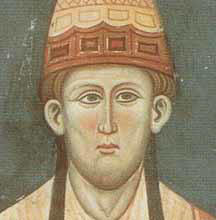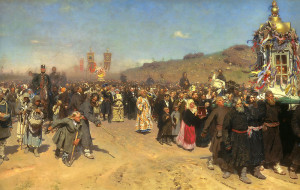 This is about a piece that comes from the Daily Beast, so a few caveats are in order, even if we ignore a headline (“Why American Social Conservatives Love Anti-Gay Putin”) that may not be the work of James Kirchick, the article’s author.
This is about a piece that comes from the Daily Beast, so a few caveats are in order, even if we ignore a headline (“Why American Social Conservatives Love Anti-Gay Putin”) that may not be the work of James Kirchick, the article’s author.
I doubt, for example, whether this “many” is accurate:
Many of those self-same religious conservatives who cheered wildly when Ronald Reagan denounced the “Evil Empire,” are citing Russia as the world’s foremost defender of traditional values.
“Many”? Really?
And this is ludicrous:
Russia today under the heel of President Vladimir Putin is arguably less free than it was in the late stages of the Soviet Union under Mikhail Gorbachev.
Uh, no.
The direction of change in the late-Gorbachev era (unless, say, you were a Lithuanian border guard), might have been more favorable than it is in Russia today, but, for all the reversion to authoritarianism seen in recent years, Russia is still infinitely more free than it was in 1989-91.
But…
On June 30, Putin signed into law a now infamous measure banning “non-traditional relationships propaganda,” a catch-all term which legal experts say prohibits everything from gay pride parades to gay couples holding hands in public.
The law had earlier passed in the Duma by a vote of 436-0.
Back to the Daily Beast:
“Russians do not want to follow America’s reckless and decadent promotion of gender confusion, sexual perversion, and anti-biblical ideologies to youth,” Peter LaBarbera, of the outfit Americans for Truth About Homosexuality, proclaimed on his website.
“You admire some of the things they’re doing in Russia against propaganda,” Austin Ruse, president of the U.S.-based Catholic Family and Human Rights Institute, told the Associated Press last month, before lamenting, “on the other hand, you know it would be impossible to do that here.” Ruse recently traveled to Russia, and wrote a piece for the Daily Caller entitled, “Putin is not the gay bogeyman,” in which he defended the draconian legislation.
“Openly gay ambassadors are now placed in largely religious countries,” Ruse complained. “Gay celebrations are now held in U.S. embassies, even in countries like Pakistan where such parties are calculated to deeply offend legitimate religious sensibilities and beliefs.” Of course, Christians are also discriminated against in Pakistan. Presumably Ruse also opposes the U.S. Embassy’s Christmas Party, which is similarly “calculated to deeply offend legitimate religious sensibilities and beliefs”?
…Scott Lively, an American conservative activist largely credited for inspiring legislation in Uganda that would impose the death penalty on homosexuals, praised the Russian legislation on his website, writing, “I can’t point to any country of the world today that is a model for the rest of the world, except perhaps for Russia, which has just taken the very important and frankly necessary step of criminalizing homosexual propaganda to protect the society from being ‘homosexualzed [sic].’” In 2007, Lively traveled across Russia on a 50-city tour, during which he recommended the very measures included in the Russian bill. Lively is the author of a book entitled “The Pink Swastika,” which argues that German Nazism was a gay conspiracy.
So supportive of Russia are social conservatives that many of them plan to travel to Moscow next year for the 8th international conference of the World Congress of Families, which proclaims on its website that, “Ideologies of statism, individualism and sexual revolution, today challenge the family’s very legitimacy as an institution.” Russia, the organization proclaims, is known for “its historic commitment to deep spirituality and morality.”
Well yes and no at an individual and cultural level. But the use that the czarist state made of religion was not so much about “spirituality and morality” as it was about creating an ideology that both cemented an idea of Russianness across very disparate peoples, and provided a justification for absolutism, a notion that was reduced to the formula “authority, orthodoxy and nationality” under Nicholas I.
Kirchick, again:
Social conservative love for Vladimir Putin’s Russia should not come as much of a surprise. After the fall of the Soviet Union, Russia eventually reverted to an authoritarian system that more resembles the governance of the Tsarist period than a modern liberal democracy. Russia is now heavily influenced once again by the Orthodox Church, which has essentially become a state religion and has openly declared its support for Putin’s gangster regime. Writing in Newsweek last year, Peter Pomerantsev reported that the Church has “been critical in helping Putin recast the liberal opposition’s fight against state corruption and alleged electoral fraud into a script of ‘foreign devils’ versus ‘Holy Russia.’” Shorn of its communist atheism, Russia is now a reactionary’s paradise. Those who sensed authoritarian tendencies lurking within the American religious right have had their suspicions confirmed by such vocal support for the Russian dictator.
The idea of a monolithic “religious right” is absurd, but nevertheless…
This preference for the strong, righteous hand was visible in the saga of Pussy Riot, the Russian feminist punk rock collective whose show trial last year after a “blasphemous” performance in an Orthodox Church became an international cause célèbre. While everyone from Madonna to Amnesty International protested, the Russian Foreign Ministry boasted that the harsh sentencing of the group to two years in prison demonstrated that it was Moscow which today stands for “Christian values” forgotten in the “postmodern West,” a point echoed by American social conservatives. “In an ironic reversal in time, as America has declared war on the church and Christians, Russians have come back to the church,” the Reverend Austin Miles wrote on the website of the Christian Coalition. “While America has allowed itself to be kicked into the gutter, Russia, the former Communist Soviet Union, has picked up the baton, rapped some knuckles and proclaimed sternly: ‘Do not foul religion or the church.’” What he and other defenders of Putin forgot to mention, however, was that the Pussy Riot protest was specifically aimed at the Church’s open and unapologetic collaboration with an undemocratic and oppressive regime.
Indeed it was (something that, as I noted here, appeared to have been forgotten/ignored by at least two Republican congressmen, Reps Rohrabacher and King).
At this point it might be worth linking again to a post I put up here in January.
Here’s an extract:
Vladimir Putin’s attempt to blend social conservatism and Russian Orthodoxy into the mix that is (nominally: the reality is rather grubbier) the ideology of his regime continues. The Guardian has the details.
First, we have an unpleasant piece of anti-homosexual legislation (in wording, context and intent far broader—and far nastier than the “Section 28” that was, to say the least, one of the Thatcher era’s less glorious achievements):
“The law in effect makes it illegal to equate straight and gay relationships, as well as the distribution of material on gay rights. It introduces fines for individuals and media groups found guilty of breaking the law, as well as special fines for foreigners.”
And then we have this:
“Minutes after passing the anti-gay legislation, the Duma also approved a new law allowing jail sentences of up to three years for “offending religious feelings”, an initiative launched in the wake of the trial against the anti-Kremlin punk band Pussy Riot.”
There ought, of course, to be no ‘right’ not to be offended. What’s particularly interesting about the latter law, however, is the way that it borrows from western neo-blasphemy legislation…
For a glance at where Putin’s efforts could lead, this post by Andrew Sullivan on an incident of bullying recently video-recorded in St. Petersburg is well worth reading. As he notes, it is “a scene reminiscent of fascist states in the early 1930s”, down, I might add, to the undertone that Sullivan also detects…
This is not something to be cheering on.
 Over at the National Catholic Reporter, John Allen exults over the undeniable success of the early months in office of the genial, (sort of Peronist) prelate now known as Pope Francis.
Over at the National Catholic Reporter, John Allen exults over the undeniable success of the early months in office of the genial, (sort of Peronist) prelate now known as Pope Francis.

